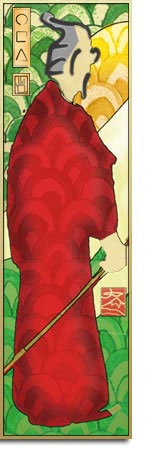On The Way: The Daily Zen Journal
The Mind of No-Mind “Mushin no Shin”
Takuan Soho (1573-1645)
A mind unconscious of itself is a mind that is not at all disturbed by affects of any kind. It is the original mind and not the delusive one that is chock-full of affects. It is always flowing, never halts, nor does it turn into a solid. As it has no discrimination to make, no affective preference to follow, it fills the whole body, pervading every part of the body, and nowhere standing still.
It is never like a stone or a piece of wood. It feels, it moves, it is never at rest. If it should find a resting place anywhere, it is not a mind of no-mind. A no-mind keeps nothing in it. It is also called, munen, “no-thought.” Mushin and munen are synonymous.
When mushin or munen is attained, the mind moves from one object to another, flowing like a stream of water, filling every possible corner. For this reason the mind fulfills every function required of it. But when the flowing is stopped at one point, all the other points will get nothing of it, and the result will be a general stiffness and obduracy.
The wheel revolves when it is not too tightly attached to the axle. When it is too tight, it will never move on. If the mind has something in it, it stops functioning, it cannot hear, it cannot see, even when a sound enters the ears or a light flashes before the eyes.
To have something in mind means that it is preoccupied and has no time for anything else. But to attempt to remove the thought already in it is to refill it with another something. The task is endless. 
It is best, therefore, not to harbor anything in the mind from the start. This may be difficult, but when you go on exercising kufu toward the subject, you will after some time come to find this state of mind actualized without noticing each step of the progress. Nothing, however, can be accomplished hurriedly.
Tradition has it that Yagyu left a poem to one of his sons expressive of the secret of his school of swordsmanship.
Behind the technique, know that there
Is the spirit (ri):
It is dawning now;
Open the screen,
And lo, the moonlight is shining in!
This may sound highly mystical. The strangest thing, however, is: What has the art of swordplay – which bluntly speaking, consists in mutual killing – to do with such content as is communicated in the poem on the moon at the break of day?
In Japan, the dawn-moonlight has rich poetical associations. Yagyu’s allusion to it is understandable from this angle, but what has the sword to do with poetry about the moon? What inspiration is the swordsman expected to get from viewing the moon as the day dawns?
What secret is here? After going through many a tragic scene, which the man must no doubt have witnessed, with what poetic enlightenment is he expected to crown all his past experience? The author is here telling us, naturally, to have an inner light on the psychology of swordsmanship.
Yagyu the master knows that technique alone will never make a person the perfect swordsman. He knows that the spirit (ri) or inner experience (satori) must back the art, which is gained only by deeply looking into the inmost recesses of the mind (kokoro).
That is why his teacher Takuan is never tired of expanding on the doctrine of emptiness, which is the metaphysics of mushin no shin (mind of no-mind). Emptiness or no-mind-ness may appear to be something most remote from our daily experience, but we now realize how intimately it is related to the problem of life and death with which most of us nowadays remain unconcerned.
Takuan Soho (1573-1645)
excerpted Zen and Japanese Culture D.T. Suzuki (1971)
Takuan Soho was Zen monk, calligrapher, painter, poet, gardener, tea master, and perhaps, inventor of the pickle that even today retains his name. His writings were prodigious filling six volumes, and are a source of guidance and inspiration to the Japanese people today as they have been for three and a half centuries. He moved freely throughout the society of his time being advisor and confidant to both shogun and emperor.
He seems to have remained unaffected by his fame and popularity. At the approach of his death he instructed his disciples, “Bury my body in the mountain behind the temple, cover it with dirt and go home. Read no sutras, hold no ceremony. Let the monks wear their robes, eat their meals, and carry on as on normal days.” At his final moment he wrote the Chinese character for yume – dream, put down his brush, and died.




Takuan's letter to Yagyu the swordmaster reveals some of the depth of the art of the sword, an art combining technique and spirit with consequences far beyond the sore muscles of a sitting cushion. The sword is an extension of the swordsman and an expression of spirit – or a deeply revealing demonstration of attachment to technique. To one cultivating their spirit through this Way, the above letter has points which take years to internalize even with deep and continual reflection.
We have to trust in that perfect unadorned perception. The very mind that wants to control things is the mind that's caught up to begin with. When you're caught up, you have fewer possibilities. Your mind can manifest in more ways if you keep it from taking form. Technique is just a means for understanding that. Do you understand what it means to not let your mind take form? When you allow the mind to harden itself into a shape, a feeling, an intensity, technique, or strategies rather than allowing that clear, mirror like perception to arise, that is allowing the mind to take form.
The technique is something you do while you try not to let it interfere with the spaciousness of your mind. If you let your mind take form, it becomes localized. When you feel that happen, Return and come back to a formless state. The more that you can do that, the more you'll be your own person. The less you can do that, the more circumstances will dictate to you who you are at every moment.
From unpublished transcripts 1998
Dedicated to a life of Flow,
Elana, Scribe for Daily Zen